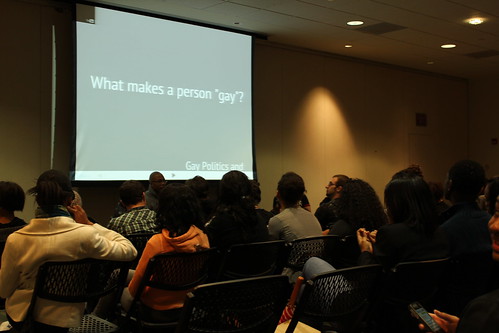
Attendees discuss issues such as racism, homophobia and personal acceptance at the Personality vs. Sexuality panel event on Nov. 15.
What makes a person gay? Why does it matter? Would Martin Luther King Jr. have participated in a gay pride march?
These were just some of the questions asked during the Personality vs. Sexuality discussion panel on Nov. 15 in the Student Center.
Organized by the Queer Student Union, Progressive NAACP and Purple Circle, the event served as a forum for discussing racism and homophobia.
Community coordinator and sophomore neuroscience major Ari Jones said the goal of the discussion panel was to desegregate Main Campus.
“We are advocates for the rights of people of all colors,” Jones said. “We want to shed some light on the issues surrounding the gay and black communities. Our mission is to bridge the gap between Temple’s diverse groups.”
More than 80 students attended the discussion, which touched on topics like stereotypes, labels and job discrimination.
As the panel traded stereotypes including “lesbians being promiscuous” and black males being “consistently loud,” panelist and senior public communications major Malcolm Kenyatta dissected the origins of stereotypes.
“The phrase ‘true stereotype’ is an oxymoron,” Kenyatta said. “People are not finding value in certain labels because those labels are not held in high esteem. Calling a certain action a stereotype is something we do to make it fit in our culture. Stereotypes are simply truths that have been exaggerated.”
After watching a clip of Wanda Sykes chastising a couple of 16-year-old boys for using the phrase “that’s so gay,” the panel analyzed similar phrases in society like “no homo” and “pause.”
Panelist and sophomore advertising major Brianna Edwards, president of the Queer Student Union, explained such phrases may seem harmless but they send the message that being homosexual is wrong.
“It is not homosexuality that is rising in America, it is homophobia,” Edwards said.
“‘No homo’ means that it is not cool to be gay, and to a deeper extent, not acceptable to be effeminate,” Edwards said. “While some people feel that coming out isn’t necessary, other people just can’t put themselves back in the closet.”
In addition to personal anecdotes of prejudice and struggle from the audience, statistics were presented regarding the lack of protection against hate crimes upon the GLBT community in Pennsylvania.
Same-sex marriages and same-sex unions remain illegal in Pennsylvania. However, GLBT members cannot be evicted or fired due to their sexual orientation in Philadelphia County.
When an audience member mentioned some people are afraid to own their homosexuality due to conflicting with their family’s image of them, panelist and first year graduate student Nick Kirkstadt said that family and culture aid in shaping who we become rather than define who we are.
“I was asked to join this panel because I contribute a different view,” Kirkstadt said.
“As a player in the gay-straight football league, I deal with issues surrounding heterosexual males and homosexual males on a daily basis,” Kirkstadt added. “My parents still tell me that it is just a phase, but I know that it’s not.”
Tensions rose during the discussion about job discrimination as panelist and junior criminal justice major Patrick Williams II stunned the audience by claiming that he would not want his child to be taught by a gay male teacher.
“Growing up in an old school Caribbean environment, I was taught to respect human beings,” Williams said.
“However, everyone has choices and my father chose not to associate with homosexuals and neither do I. I am not against homosexuality. I just don’t prefer it,” Williams added.
Kenyatta quickly retorted by asking, “Why do you have to be homophobic to display heterosexual masculinity?”
As the audience responded in an uproar, Kirkstadt said that the entire purpose of the event was to demonstrate how everyone is entitled to their opinions.
“I disagree with everyone attacking [Williams],” Kirkstadt said. “Even though he bashed my profession of teaching, I respect his belief because it is a result of his upbringing. Everyone went into defense mode, which is understandable when dealing with sensitive issues.”
Once the audience calmed down, Tiffanni Osborne, a junior African-American studies student, summed up the sentiment of the event.
“Tonight we had a necessary and well-represented discussion,” Osborne said.
“Different groups are being oppressed and different struggles are happening,” Osborne added. “Now that people realize the universality of oppression, there is no excuse to step in and help out.”
John Corrigan can be reached at john.corrigan@temple.edu.



Be the first to comment